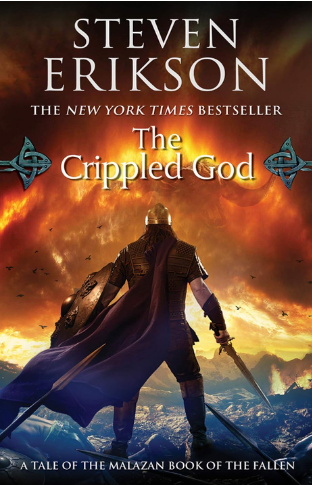The Crippled God

"The Crippled God" by Steven Erikson is the tenth and final book in the Malazan Book of the Fallen series, and it offers a complex, emotionally charged conclusion to one of the most ambitious epic fantasy series in modern literature. With its intricate storytelling, deep character arcs, and philosophical underpinnings, the book stands as a testament to Erikson’s mastery of the genre.
The plot of The Crippled God revolves around the culmination of the conflicts and struggles that have spanned the entire series. As the world hurtles toward a dramatic reckoning, the powerful Crippled God, a mysterious and tragic figure, plays a central role in the impending chaos. The novel follows multiple factions and characters—ranging from the Bonehunters, the Tiste Andii, to Karsa Orlong, and the Bridgeburners—as they all wrestle with their respective roles in the fate of the world. While dealing with both external threats and their own personal demons, the characters are drawn toward the inevitable conclusion of their destinies.
The story intertwines multiple plots, exploring themes such as sacrifice, redemption, vengeance, and the cost of power. The world is on the brink of destruction, and the characters must face the consequences of the choices they have made over the course of the series.
As the finale to Malazan Book of the Fallen, The Crippled God delivers a highly satisfying conclusion for readers who have followed the series from the beginning. The emotional weight of the narrative is felt throughout, with numerous characters confronting their pasts, their failures, and their futures. Erikson does an excellent job of tying up long-running storylines and providing resolutions for the complex relationships and struggles of the characters.
Erikson successfully concludes the overarching narrative with a climactic and emotional finale. The way he balances multiple character arcs and storylines while tying them together into a cohesive conclusion is impressive.
The book provides profound resolutions for several major characters. Many of the characters' long-running arcs culminate in moments of redemption, sacrifice, or tragic resolution, which provides a satisfying emotional payoff.
As with much of the series, The Crippled God explores deep themes, such as the nature of pain, suffering, and the possibility of redemption. The novel offers a thoughtful exploration of the human condition, framed within a larger epic struggle.
The world-building that has been a hallmark of the Malazan series reaches its peak here, as Erikson fully explores the consequences of the events that have unfolded over the series' ten books.
While the book is a masterful conclusion, the pacing can be slow at times, especially in the middle sections. Some readers may find it difficult to navigate the dense narrative.
The Crippled God continues the series’ tradition of dense, layered prose and a vast array of characters. It’s not a book that can be easily read without having followed the rest of the series, so it may be overwhelming for newcomers.
If you’ve been following Malazan Book of the Fallen, "The Crippled God" is an essential and highly rewarding read. It brings closure to the series’ long-running plots and character arcs, making it a must-read for fans of the series. The conclusion is emotionally powerful, philosophically rich, and expertly crafted, making it one of the standout entries in the genre. However, if you are not already familiar with the Malazan books, this novel is not a good starting point; it assumes that readers have a deep investment in the characters and events that have been built up over the series.
For those who are invested in epic fantasy and enjoy complex, character-driven narratives, The Crippled God is a fitting conclusion to a landmark series in the genre.